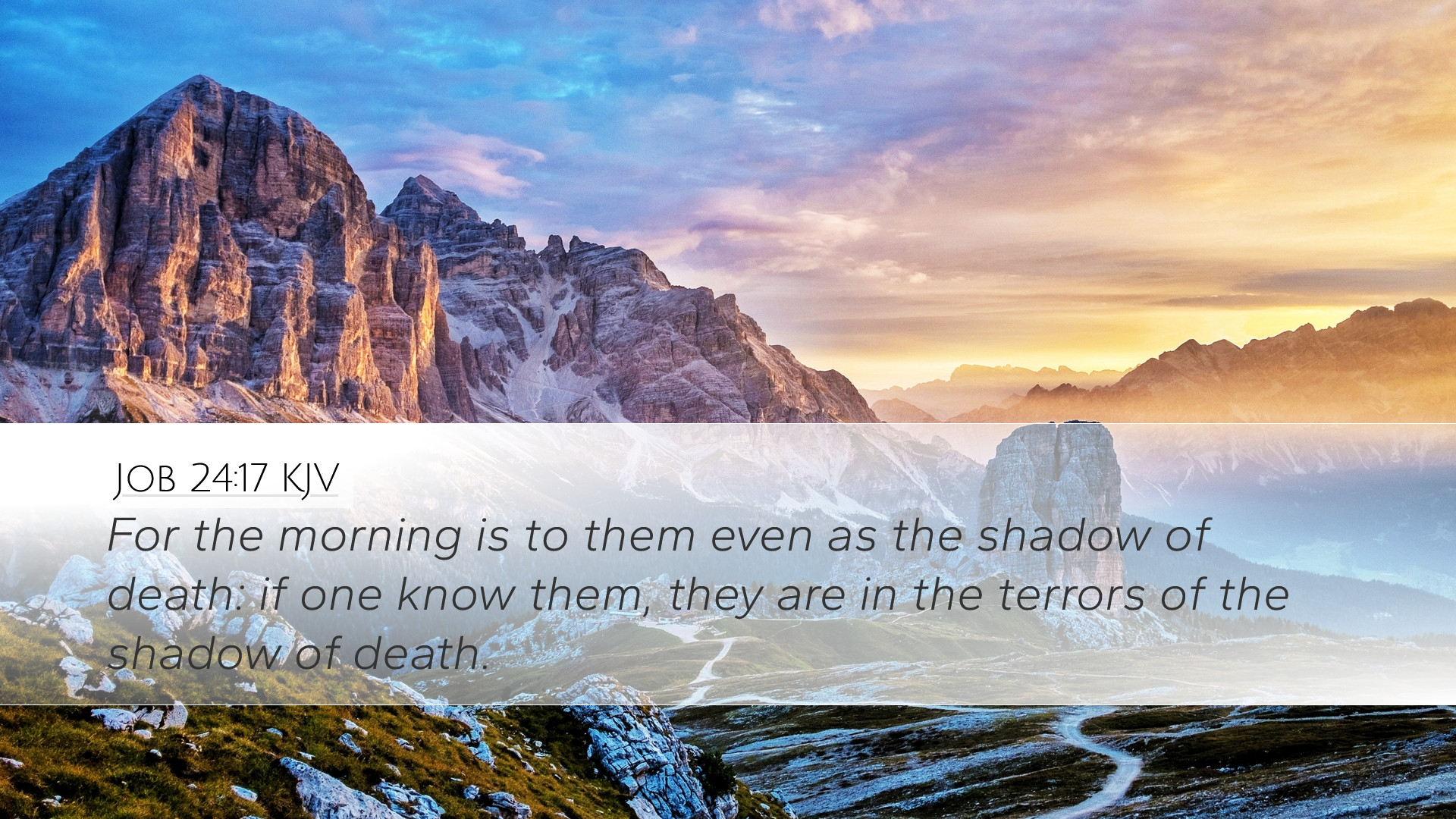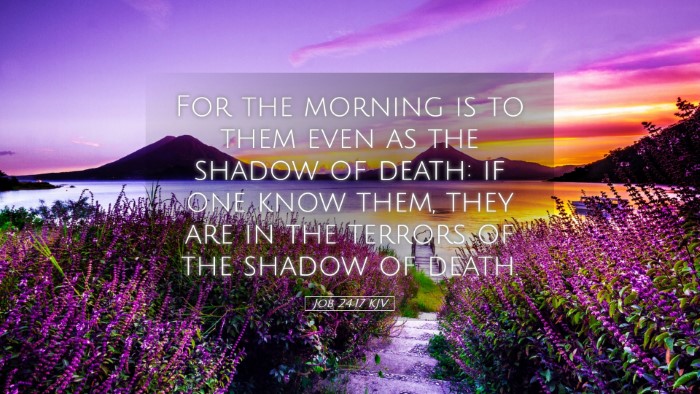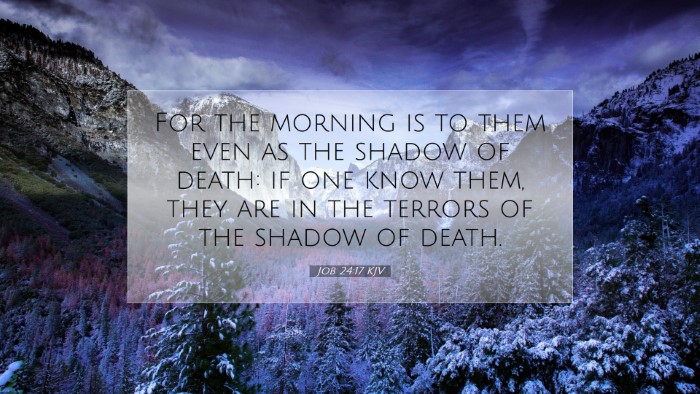Old Testament
Genesis Exodus Leviticus Numbers Deuteronomy Joshua Judges Ruth 1 Samuel 2 Samuel 1 Kings 2 Kings 1 Chronicles 2 Chronicles Ezra Nehemiah Esther Job Psalms Proverbs Ecclesiastes Song of Solomon Isaiah Jeremiah Lamentations Ezekiel Daniel Hosea Joel Amos Obadiah Jonah Micah Nahum Habakkuk Zephaniah Haggai Zechariah MalachiJob 24:17
Job 24:17 KJV
For the morning is to them even as the shadow of death: if one know them, they are in the terrors of the shadow of death.
Job 24:17 Bible Commentary
Commentary on Job 24:17
Verse Context: Job 24:17 states, "For them, morning is like the shadow of death: if one know them, they are in the terrors of the shadow of death." This verse presents profound insights into the struggles of the wicked and the perception of their lives, particularly in suffering and despair.
Thematic Overview
This verse captures the duality of existence, particularly the contrasting experiences of the righteous and the wicked. While the righteous may experience the light of hope and redemption, the wicked dwell in the shadows, constantly under the threat of mortality and despair.
Insights from Public Domain Commentaries
1. Matthew Henry
Matthew Henry highlights the metaphorical significance of "the shadow of death" as representative of profound darkness and hopelessness that encompasses the life of the wicked. He reflects on the inevitability of death that looms closer than they realize, which serves as a reminder of the fleeting nature of their lives filled with sin. Henry emphasizes the moral implications of living in such a state, suggesting that without repentance, individuals remain trapped in a cycle of despair.
- On Spiritual Blindness: Henry notes that those who dwell in such darkness are spiritually blind, failing to see the path of righteousness that leads to life. The metaphor "morning" symbolizes the possibility of grace and redemption, yet for the wicked, it continuously eludes them.
- The Reality of Judgment: He also stresses the certainty of divine judgment that awaits those who choose wickedness. Job’s lamentation speaks to the broader question of justice in the world, affirming the belief that while the wicked seem to prosper, their end is ultimately destruction.
2. Albert Barnes
Albert Barnes provides a more analytical perspective, focusing on the psychological and emotional dimensions of Job’s statement. He interprets the phrase "shadow of death" as denoting a life surrounded by fear and uncertainty. According to Barnes, the wicked not only face physical death but also emotional and spiritual death, leaving them in a state of existential dread.
- Fear of Judgment: He emphasizes that this terror is not just impending physical death but the fear of divine judgment that is to come. The wicked live in constant anxiety, aware of their failures and the consequences that follow.
- Contrast with the Righteous: Barnes further contrasts this with the experience of the righteous, who, even in transitory sufferings, possess a hope and a peace that the wicked cannot fathom. This serves to underscore the spiritual benefits of a life aligned with God’s will.
3. Adam Clarke
Adam Clarke's commentary begins with a thorough exegesis of the Hebrew text behind Job 24:17. He notes that the "morning" signifies an opportunity for renewal and hope, which is drastically out of reach for the wicked, who remain entangled in darkness.
- Death as a Constant Reality: Clarke points out that the wicked's experience of morning reflects their inability to see beyond their impending doom, a perspective colored by their actions and choices. This brings a sense of urgency to the text regarding repentance and divine grace.
- Moral Instruction: He also stresses the importance of this verse as a moral lesson for believers. They are called to recognize the fleeting nature of worldly pleasure and to cling to the eternal hope found in God, avoiding the anguish of living outside His will.
Practical Applications
This passage offers significant insights for pastors and theologians. Here are some practical applications:
- Encouragement for the Righteous: For believers, this verse serves as a reminder to maintain focus on God’s promises and resist despair amid adversity, knowing that hope exists beyond the shadows.
- Warning to the Wicked: Ministers can use this passage to warn unrepentant sinners of the dire consequences of their choices and encourage them towards repentance, highlighting the hope available in Christ.
- Pastoral Counseling: In counseling scenarios, this verse can be referenced in discussions about hopelessness, where the counsel can guide individuals to consider the difference between living in light versus darkness.
Theological Reflection
Job 24:17 fosters reflection on the nature of evil, suffering, and divine justice. Theologically, this passage invites exploration into the character of God as just and holy. It emphasizes that while tribulation is part of the believer's journey, they do not have to walk in darkness as those who do not know His ways. The overarching narrative of grace through the suffering servant, ultimately fulfilled in Christ, provides a profound contrast to the fate of the wicked described in this verse.
Conclusion
In conclusion, Job 24:17 encapsulates the profound existential dilemmas faced by humanity in the tension between good and evil. The compendium of insights from Henry, Barnes, and Clarke compels readers to ponder their spiritual state and the implications of their choices. For scholars and pastors, engaging with this text can lead to deeper theological understanding and more profound pastoral care, encouraging believers toward light and warning against the shadows of death that ensnare the wicked.


